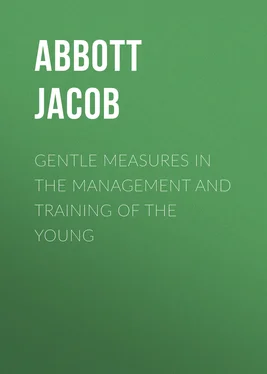Jacob Abbott - Gentle Measures in the Management and Training of the Young
Здесь есть возможность читать онлайн «Jacob Abbott - Gentle Measures in the Management and Training of the Young» — ознакомительный отрывок электронной книги совершенно бесплатно, а после прочтения отрывка купить полную версию. В некоторых случаях можно слушать аудио, скачать через торрент в формате fb2 и присутствует краткое содержание. Жанр: foreign_edu, pedagogy_book, upbringing_book, на английском языке. Описание произведения, (предисловие) а так же отзывы посетителей доступны на портале библиотеки ЛибКат.
- Название:Gentle Measures in the Management and Training of the Young
- Автор:
- Жанр:
- Год:неизвестен
- ISBN:нет данных
- Рейтинг книги:5 / 5. Голосов: 1
-
Избранное:Добавить в избранное
- Отзывы:
-
Ваша оценка:
- 100
- 1
- 2
- 3
- 4
- 5
Gentle Measures in the Management and Training of the Young: краткое содержание, описание и аннотация
Предлагаем к чтению аннотацию, описание, краткое содержание или предисловие (зависит от того, что написал сам автор книги «Gentle Measures in the Management and Training of the Young»). Если вы не нашли необходимую информацию о книге — напишите в комментариях, мы постараемся отыскать её.
Gentle Measures in the Management and Training of the Young — читать онлайн ознакомительный отрывок
Ниже представлен текст книги, разбитый по страницам. Система сохранения места последней прочитанной страницы, позволяет с удобством читать онлайн бесплатно книгу «Gentle Measures in the Management and Training of the Young», без необходимости каждый раз заново искать на чём Вы остановились. Поставьте закладку, и сможете в любой момент перейти на страницу, на которой закончили чтение.
Интервал:
Закладка:
Let it be remembered, now, that the efficacy of such management as this consists not in the devising of it, nor in holding such a conversation as the above with the boy—salutary as this might be—but in the faithfulness and strictness with which it is followed up during the fortnight of trial.
In the case in question, the progress which George made in diminishing his tendency to get into disputes with his sister was so great that his mother told him, at the end of the first fortnight, that their plan had succeeded "admirably"—so much so, she said, that she thought the punishment of taking off his jacket and turning it inside out would be for the future unnecessarily severe, and she proposed to substitute for it taking off his cap, and putting it on wrong side before.
The reader will, of course, understand that the object of such an illustration as this is not to recommend the particular measure here described for adoption in other cases, but to illustrate the spirit and temper of mind in which all measures adopted by the mother in the training of her children should be carried into effect. Measures that involve no threats, no scolding, no angry manifestations of displeasure, but are even playful in their character, may be very efficient in action if they are firmly and perseveringly maintained.
There is great advantage in adapting the character of the punishment to that of the fault—making it, as far as possible, the natural and proper consequence of it. For instance, if the boys of a school do not come in promptly at the close of the twenty minutes' recess, but waste five minutes by their dilatoriness in obeying the summons of the bell, and the teacher keeps them for five minutes beyond the usual hour of dismissal , to make up for the lost time, the punishment may be felt by them to be deserved, and it may have a good effect in diminishing the evil it is intended to remedy; but it will probably excite a considerable degree of mental irritation, if not of resentment, on the part of the children, which will diminish the good effect, or is, at any rate, an evil which is to be avoided if possible.
If now, on the other hand, he assigns precisely the same penalty in another form, the whole of the good effect may be secured without the evil. Suppose he addresses the boys just before they are to go out at the next recess, as follows:
"I think, boys, that twenty minutes is about the right length of time for the recess, all told—that is, from the time you go out to the time when you are all back in your seats again, quiet and ready to resume your studies. I found yesterday that it took five minutes for you all to come in—that is, that it was five minutes from the time the bell was rung before all were in their seats; and to-day I shall ring the bell after fifteen minutes, so as to give you time to come in. If I find to-day that it takes ten minutes, then I will give you more time to come in to-morrow, by ringing the bell after you have been out ten minutes."
"I am sorry to have you lose so much of your recess, and if you can make the time for coming in shorter, then, of course, your recess can be longer. I should not wonder if, after a few trials, you should find that you could all come in and get into your places in one minute; and if so, I shall be very glad, for then you can have an uninterrupted recess of nineteen minutes, which will be a great gain."
Every one who has had any considerable experience in the management of boys will readily understand how different the effect of this measure will be from that of the other, while yet the penalty is in both cases precisely the same—namely, the loss, for the boys, of five minutes of their play.
In the same manner, where a child three or four years old was in the habit, when allowed to go out by himself in the yard to play, of running off into the street, a very appropriate punishment would be to require him, for the remainder of the day, to stay in the house and keep in sight of his mother, on the ground that it was not safe to trust him by himself in the yard. This would be much better than sending him to bed an hour earlier, or subjecting him to any other inconvenience or privation having no obvious connection with the fault. For it is of the greatest importance to avoid, by every means, the exciting of feelings of irritation and resentment in the mind of the child, so far as it is possible to do this without impairing the efficiency of the punishment. It is not always possible to do this. The efficiency of the punishment is, of course, the essential thing; but parents and teachers who turn their attention to the point will find that it is much less difficult than one would suppose to secure this end completely without producing the too frequent accompaniments of punishment—anger, ill-temper, and ill-will.
In the case, for example, of the child not allowed to go out into the yard, but required to remain in the house in sight of his mother, the mother should not try to make the punishment more heavy by speaking again and again of his fault, and evincing her displeasure by trying to make the confinement as irksome to the child as possible; but, on the other hand, should do all in her power to alleviate it. "I am very sorry," she might say, "to have to keep you in the house. It would be much pleasanter for you to go out and play in the yard, if it was only safe. I don't blame you very much for running away. It is what foolish little children, as little as you, very often do. I suppose you thought it would be good fun to run out a little way in the street. And it is good fun; but it is not safe. By-and-by, when you grow a little larger, you won't be so foolish, and then I can trust you in the yard at any time without having to watch you at all. And now what can I get for you to amuse you while you stay in the house with me?"
Punishment coming in this way, and administered in this spirit, will irritate the mind and injure the temper comparatively little; and, instead of being less; will be much more effective in accomplishing the right kind of cure for the fault, than any stern, severe, and vindictive retribution can possibly be.
The question of resorting to corporal punishment in the training of the young has been much, very much, argued and discussed on both sides by writers on education; but it seems to me to be mainly a question of competency and skill. If the parent or teacher has tact or skill enough, and practical knowledge enough of the workings of the youthful mind, he can gain all the necessary ascendency over it without resort to the violent infliction of bodily pain in any form. If he has not these qualities, then he must turn to the next best means at his disposal; for it is better that a child should be trained and governed by the rod than not trained and governed at all. I do not suppose that savages could possibly control their children without blows; while, on the other hand, Maria Edgeworth would have brought under complete submission to her will a family of the most ardent and impulsive juveniles, perhaps without even a harsh word or a frown. If a mother begins with children at the beginning, is just and true in all her dealings with them, gentle in manner, but inflexibly firm in act, and looks constantly for Divine guidance and aid in her conscientious efforts to do her duty, I feel quite confident that it will never be necessary for her to strike them. The necessity may, however, sooner or later come, for aught I know, in the case of those who act on the contrary principle. Under such management, the rod may come to be the only alternative to absolute unmanageableness and anarchy.
Читать дальшеИнтервал:
Закладка:
Похожие книги на «Gentle Measures in the Management and Training of the Young»
Представляем Вашему вниманию похожие книги на «Gentle Measures in the Management and Training of the Young» списком для выбора. Мы отобрали схожую по названию и смыслу литературу в надежде предоставить читателям больше вариантов отыскать новые, интересные, ещё непрочитанные произведения.
Обсуждение, отзывы о книге «Gentle Measures in the Management and Training of the Young» и просто собственные мнения читателей. Оставьте ваши комментарии, напишите, что Вы думаете о произведении, его смысле или главных героях. Укажите что конкретно понравилось, а что нет, и почему Вы так считаете.












